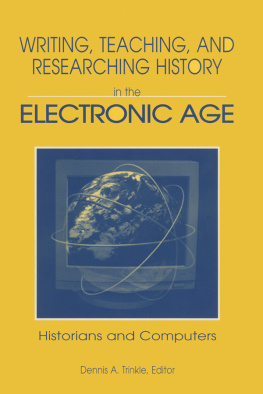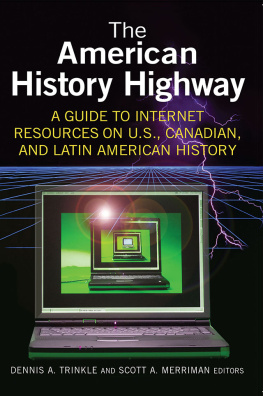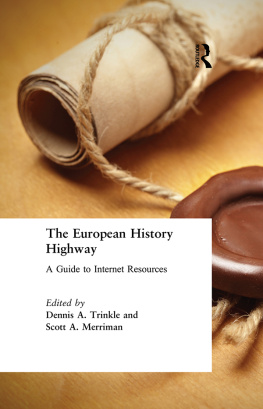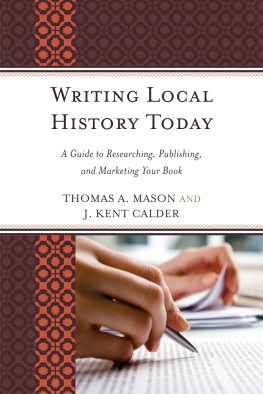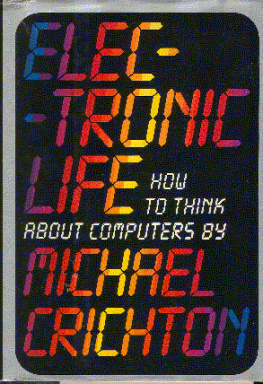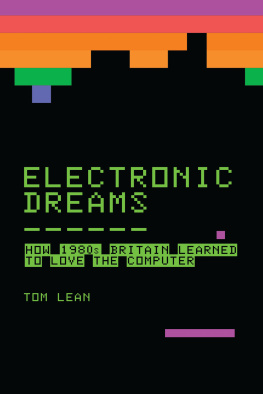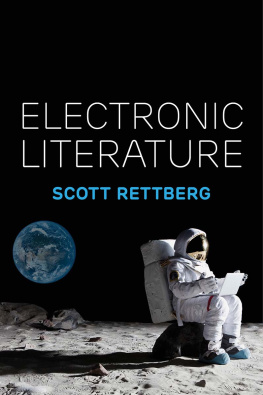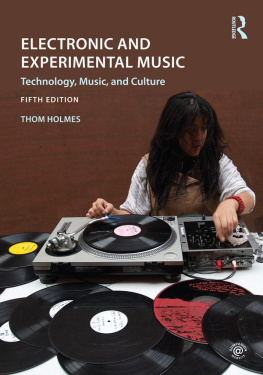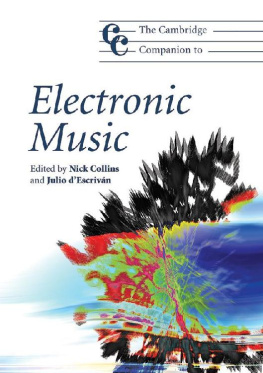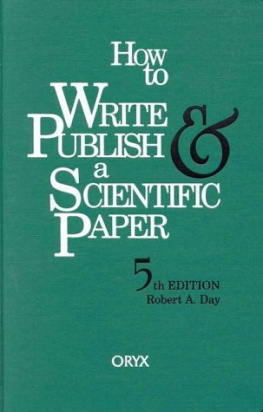WRITING, TEACHING, AND
RESEARCHING HISTORY
in the
ELECTRONIC AGE
WRITING, TEACHING, AND RESEARCHING HISTORY
in the
ELECTRONIC AGE
Historians and Computers
Dennis A. Trinkle, Editor

First published 1998 by M.E. Sharpe
Published 2015 by Routledge
2 Park Square, Milton Park, Abingdon, Oxon OX14 4RN
711 Third Avenue, New York, NY 10017, USA
Routledge is an imprint of the Taylor & Francis Group, an informa business
Copyright 1998 Taylor & Francis. All right reserved.
No part of this book may be reprinted or reproduced or utilised in any form or by any electronic, mechanical, or other means, now known or hereafter invented, including photocopying and recording, or in any information storage or retrieval system, without permission in writing from the publishers.
Notices
No responsibility is assumed by the publisher for any injury and/or damage to persons or property as a matter of products liability, negligence or otherwise, or from any use of operation of any methods, products, instructions or ideas contained in the material herein.
Practitioners and researchers must always rely on their own experience and knowledge in evaluating and using any information, methods, compounds,or experiments described herein. In using such information or methods they should be mindful of their own safety and the safety of others, including parties for whom they have a professional responsibility.
Product or corporate names may be trademarks or registered trademarks, and are used only for identification and explanation without intent to infringe.
Library of Congress Cataloging-in-Publication Data
Writing, teaching, and researching history in the electronic age : historians and computers
/ Dennis A. Trinkle, editor.
p. cm.
Includes bibliographical references and index.
ISBN 0765601788 (alk. paper) ISBN 0765601796 (pbk.: alk. paper)
1. HistoryResearch. 2. HistoryMethodology. 3. HistoryStudy and teaching.
4. Historiography. 5. HistoryComputer network resources.
6. HistoryComputer-assisted instruction. I. Trinkle, Dennis A., 1968
D16.W95 1997
907dc21
97-29298
CIP
ISBN 13: 9780765601797 (pbk)
ISBN 13: 9780765601780 (hbk)
In Honor of Frank A. Kafker
Contents
David J. Staley
M. Daniel Price
Timothy Messer-Kruse
Ellen Meserow Sauer
Scott A. Merriman
Larry J. Easley
David B. Sicilia
James A. Jones
John D. Thomas
Leslie Gene Hunter
Barbara Winslow, Kacy D. Wiggins, and Marisol Carpio
Frank E. Johnson
Ryan Johnson
Jeffrey G. Barlow
Etan Diamond, Cynthia Cunningham, and Arthur E. Farnsley II
According to popular mythology, historians are a neo-Luddite bunch. In reality, historians are not strangers to computer technology. They have long been at the forefront of the humanities in adapting electronic innovations to their discipline. The birth of social history during the decades following World War II was directly tied to the invention of programmable computers that could manipulate large, complex groups of data. When personal computers began to enter schools and households during the mid-1970s, historians again quickly responded to the possibilities for easing and improving their teaching, research, and communication. With the advent of the Internet, the World Wide Web, and faster, more sophisticated personal computers, historians are again moving rapidly to embrace the possibilities and benefits afforded by computer technology.
Consequently, history is a field of vibrant discussion about the future these days. The Internet, the World Wide Web, and hosts of new software packages have opened up seemingly limitless possibilities for historians. From multimedia presentations that combine sights, sound, and text to virtual universities that conduct classes on-line, from immense collections of primary sources that can be accessed from anywhere in the world at any time of day to discussion groups where scholars share insights and questions with colleagues from across the globe, the new technologies are presenting invigorating new modes and mediums for practicing history. These new technologies are not all milk and honey, however; they do not come without economic and human costs or limitations.
Fortunately, history at its best is a discipline that inspires a grounded and reasoned approach to the present and to the future. The 200 scholars from forty-two states and eight foreign countries who gathered together in Cincinnati in May 1997 to discuss the future of history in the computer age provide proof that a continuing and productive debate about the marriage of history and computers has begun. This volume, which grew out ofthat conference, is intended to help present a panorama of the new prospects introduced by computer technology and to foster a dialogue about their consequences and pratfalls.
The essays are divided into four areas: Redefining History in the Electronic Age, Scholarly Communication and Publication in the Electronic Age, Multimedia Approaches to Teaching History, and Computers and Historical Research. In Part I, David Staley and Daniel Price explore the ways in which the World Wide Web and Internet have the potential to reshape our understanding of history as a discipline. In Part II, Timothy Messer-Kruse, Ellen Meserow Sauer, and Scott Merriman look at the new forms of scholarly interaction and publication being fostered by the Internet. The essays by Larry Easley, David Sicilia, James Jones, John Thomas, Leslie Hunter, Barbara Winslow, Kacy Wiggins, Marisol Carpio, and Frank Johnson presented in Part III explore the various ways that computers can be employed to improve and extend the teaching of history. Finally, in Part IV, Ryan Johnson, Jeffrey Barlow, Etan Diamond, Cynthia Cunningham, and Arthur Farnsley II provide concrete examples of how electronic technology can be profitably used in historical research, and they offer balanced assessments of the prospects and perils presented by new technologies.
For historians grappling with the place of computer technology in their lives, these essays present an excellent starting point, and a good starting point is all that anyone possesses at this stage. Where computer technologies will lead and how they will be employed is very much an open question. As these essays illustrate, technology does not impose its own determinism. The path that history takes in the electronic age will be the result of choices made by individual historians and by professional groups. If these essays offer historians constructive suggestions for taking advantage of existing technologies and help spur a discipline-wide discussion about the union of technology and history, they will have served their purpose.
The essays that appear in this volume were first presented as papers at a conference on The Future of History in the Electronic Age held at the University of Cincinnati in May 1997. The conference was funded by the Charles Phelps Taft Memorial Fund and the Department of History. Additional funding was provided by History Reviews On-Line and the History Graduate Student Association. Margaret Hill, Christina Hartlieb-Reichardt, and Julie Turner provided invaluable assistance in organizing and overseeing the conference. Anna Sobol provided invaluable assistance with the index. Finally, the conference and the essays in this volume benefited immeasurably from the comments and suggestions offered by the conference participants. We are grateful to all those who took part.

